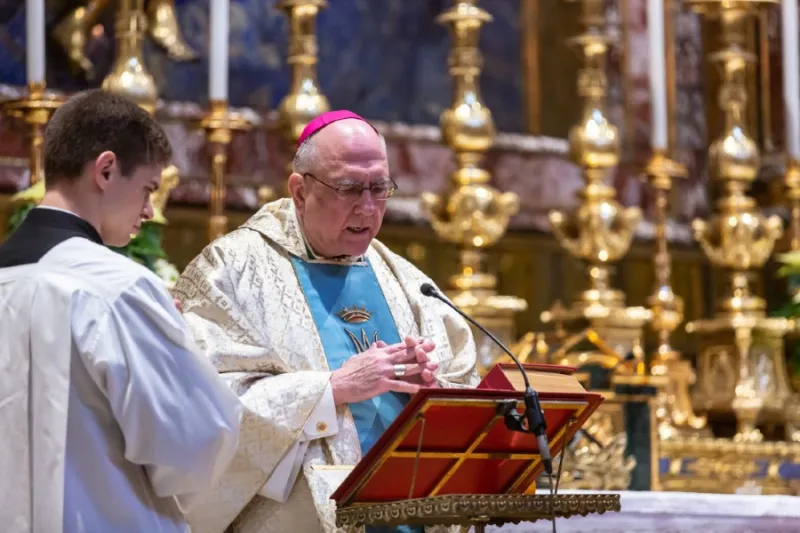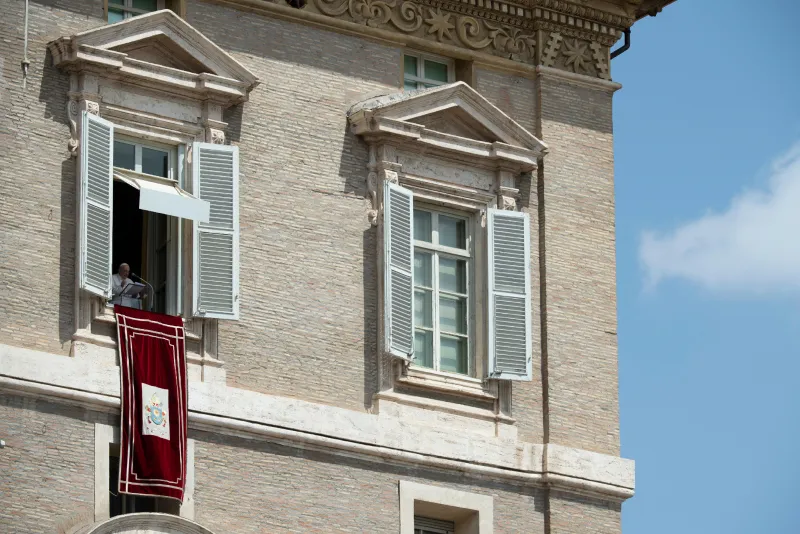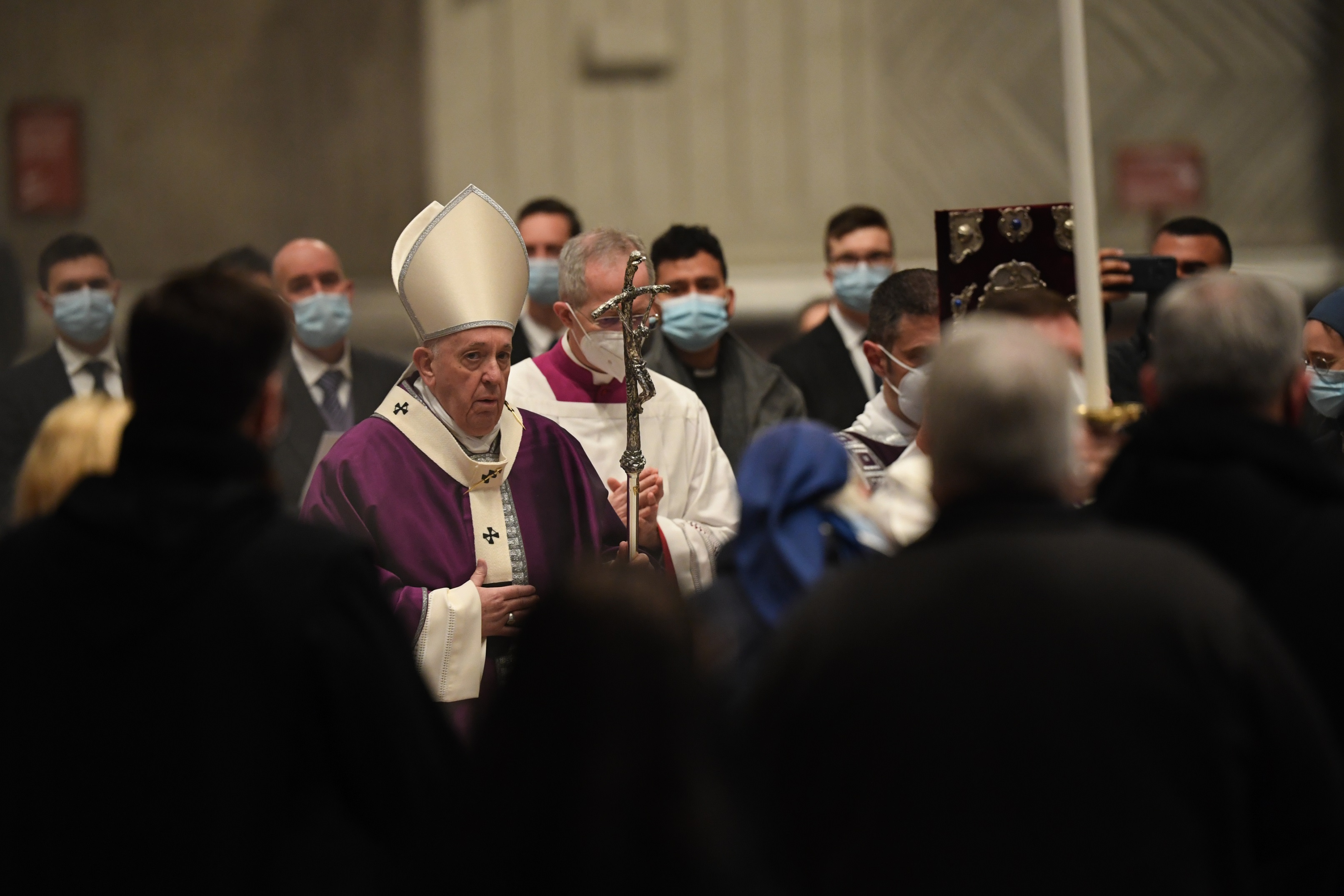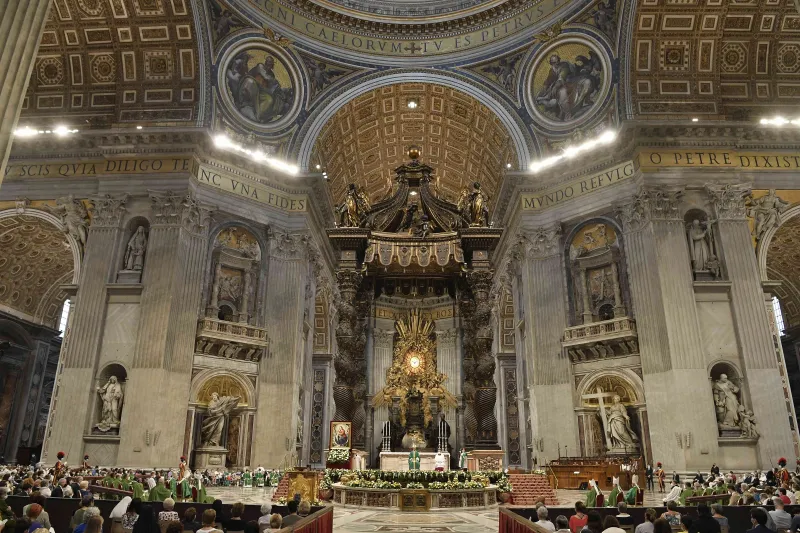 Archbishop Joseph Naumann of Kansas City in Kansas celebrates Mass with members of the U.S. bishops’ Region IX at the Basilica of St. Mary Major in Rome on Jan. 14, 2020, during their ad Limina Apostolorum visit. / Daniel Ibanez/CNA
Archbishop Joseph Naumann of Kansas City in Kansas celebrates Mass with members of the U.S. bishops’ Region IX at the Basilica of St. Mary Major in Rome on Jan. 14, 2020, during their ad Limina Apostolorum visit. / Daniel Ibanez/CNA
Washington D.C., Aug 28, 2021 / 12:01 pm (CNA).
More U.S. bishops this week issued statements on COVID-19 vaccine mandates and conscientious objection.
As employers and public places have begun mandating that workers and customers have received a COVID-19 vaccine, bishops around the country have begun issuing statements for Catholics regarding mandates and conscience exemptions.
This week, Archbishop Joseph Naumann of Kansas City in Kansas – who is also chair of the U.S. bishops’ pro-life committee – encouraged Catholics to receive a COVID-19 vaccine, in a statement issued in his capacity as archbishop of Kansas City.
“The Church upholds the permissibility of receiving the vaccines, because vaccination is by itself not evil. In fact, it is normally a virtuous act, attempting to protect the health of others as well as your own health,” he stated in an Aug. 26 press release.
Archbishop Naumann noted the ethical problems posed by the vaccines’ connection to cell lines derived from abortions decades ago. Of the three COVID-19 vaccines approved for use in the United States, two of them – produced by Pfizer and Moderna – were tested using the controversial cell lines. One of the vaccines, produced by Johnson & Johnson, utilized the cell lines in both production and testing.
Naumann clarified that the act of receiving such a vaccine is not in itself supportive of legal abortion.
“The intrinsic evil of an abortion committed almost 50 years ago or the grave injustice almost a half of century ago of a researcher taking cells from an aborted child without donor consent are not aided or encouraged by the individual receiving the vaccination,” he said.
However, he added that those receiving such a vaccine are “obligated” to advocate for ethical vaccines with no connection to the controversial cell lines. Furthermore, Naumann affirmed the conscience rights of Catholics who refuse a COVID vaccine because of its connection to abortion.
“The most charitable and just posture is to seek to accommodate the consciences of all persons,” he said. “A society that fails to respect the rights of conscience lacks a key element of the common good.”
Priests, he added, are not obliged to issue letters in support of Catholics seeking conscience exemptions to vaccine mandates.
“In pastoral care, priests are called to help Catholics to form their consciences well and obey their conscientious judgments. However, priests need not feel compelled to sign exemption letters,” he said.
“Lay Catholics can and should insist on their conscience rights and religious liberties based on the authoritative teachings of the Church found in the Catechism, papal and ecumenical council documents, the Congregation for the Doctrine of the Faith, and other sources,” he said.
Bishop Frank Caggiano of Bridgeport, in an Aug. 17 letter to clergy, said that while all Catholics have a “moral obligation” to protect the health of others during the pandemic, Catholics may refuse the vaccine if they “feel obligated in conscience” to do so.
However, he added, priests should not issue a letter on behalf of those refusing a COVID-19 vaccine out of conscience, as such a decision is a personal one and reflects “a more rigorous religious practice than recommended by the Roman Magisterium.” The Vatican’s Congregation for the Doctrine of the Faith in December 2020 said the reception of a COVID vaccine with connections to the controversial cell lines is morally permissible, if no other ethical option is available.
Other U.S. bishops have also made statements on vaccine mandates and exemptions.
Bishop Edward Weisenburger of Tuscon said that the interest of promoting the common good during the pandemic – in receiving a vaccine – supersedes personal preferences against a vaccine. His letter to priests of the diocese, reported by KGUN 9 local news, also instructed priests not to support Catholics seeking religious exemptions to vaccine mandates.
“I fail to see how a Catholic could ask for an exemption from a vaccine mandate or mask mandate based upon their Catholic faith,” he wrote.
The Diocese of Las Vegas will not be issuing religious exemptions, according to KSNV News.
“We’re calling everyone, all people of faith and goodwill to see in the decision of the diocese the weighing of various goods, the common good and the good of health and the good of following one’s conscience,” stated Bishop Gregory Gordon of Las Vegas, reported by KSNV News.

[…]










